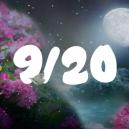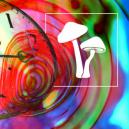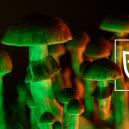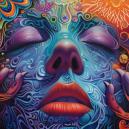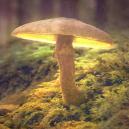Can You Get Addicted To Magic Mushrooms?
Published : February 1st, 2022

Magic mushrooms are an incredible hallucinogen—which science is continuing to indicate—and shirk many of the assumptions people hold about drugs. Not only do they appear to not be addictive, but they might even be able to treat existing addictions, and with great success. Find out more below.
Drugs have a strong association with addiction. In some cases this is with good reason, and in others it’s an over-hyped fear caused by anti-drug propaganda.
With all substance use, it’s crucial to be aware that both physical and behavioural addictions might occur, and to understand how to prevent this. But you needn’t live in fear. In fact, modern research suggests that some drugs, far from being highly addictive, may actually be therapeutic agents for treating addiction.
Magic mushrooms, along with other hallucinogens, such as ibogaine, fall into this category.
MAGIC MUSHROOMS AND ADDICTION
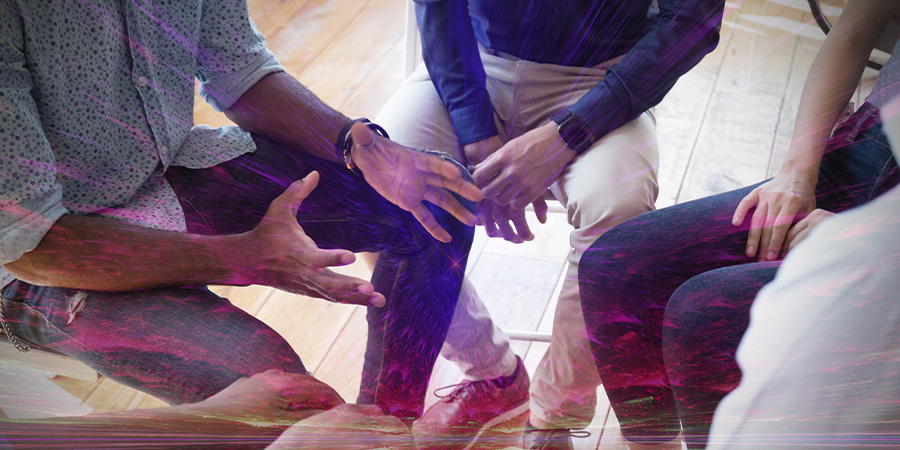
Far from being a dangerously addictive drug, there is in fact much research looking into magic mushroom’s potential for treating addictions. Moreover, some studies suggest that psilocybin, the active ingredient in dried shrooms, is among the least addictive and least dangerous psychoactive drugs in the world. The brain builds up a very quick and strong tolerance to psilocybin. If you've ever tried to take shrooms or truffles day after day, you probably found that the effects waned to almost nil very quickly. This characteristic, among many others, seems to prevent psilocybin mushrooms from being physically addictive.
Before we get too enthusiastic, there is still the potential to develop a behavioural addiction to mushrooms (though it is unclear whether people really do), and they can still cause harm in various ways, if misused. We will go more into behavioural addictions shortly. But in brief, a behavioural addiction differs from a physical addiction in that the chemicals in the substance do not directly trigger the reward system.
On the whole, though, when it comes to psilocybin mushrooms and addiction, it seems that these fungi may have far more good to offer than bad.
HOW MAGIC MUSHROOMS AFFECT YOUR BRAIN
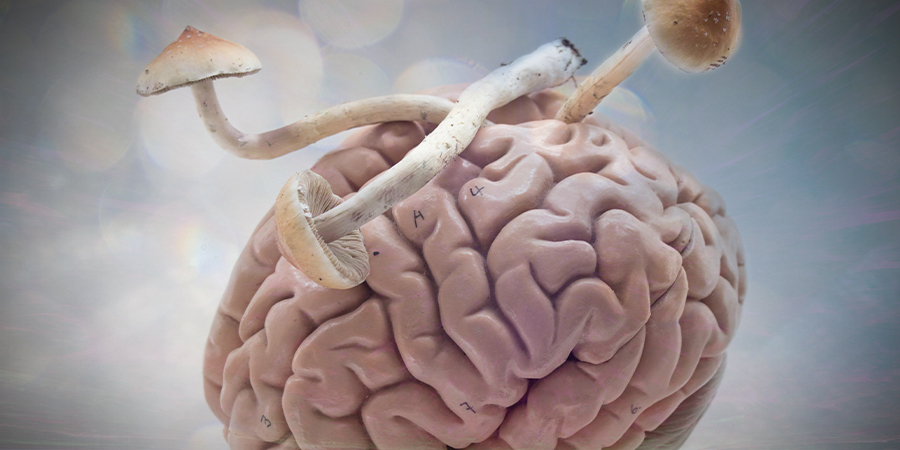
Psilocybin mushrooms, like many hallucinogens, are serotonergic. This means that they affect the brain’s serotonin system. In the case of shrooms, they seem to fire up the neurotransmitters while also changing neuron activity. This twofold process works in tandem to “destabilise” the brain.
Destabilising the brain may sound catastrophically bad, but it is thought to hold the key to psilocybin's potential therapeutic benefits. In normal life, neuron activity is fairly predictable, with set pathways being used and becoming ingrained. The continual use of certain pathways is essentially what causes addiction.
By destabilising these pathways and allowing the brain to build new ones, while also boosting levels of serotonin, old pathways can be—if not entirely erased—redirected somewhat. It is thought that this is why psilocybin may have a role to play in the treatment of addiction.
SIDE EFFECTS OF PSILOCYBIN MUSHROOMS
Shrooms may be pretty safe and even potentially beneficial, but that does not mean they are without risks. As well as the risks associated with tripping, especially when no regard is given to proper set and setting, there are a few, albeit minor, side effects associated with magic mushrooms:
- Nausea
- Stomach cramps
- Anxiety
- Increased heart rate
- Temperature fluctuations
- Drowsiness
PSILOCYBIN MUSHROOM WITHDRAWAL: IS THERE CAUSE FOR CONCERN?
Fortunately, withdrawal from magic mushrooms does not seem to be a thing. Even for regular users, there tends to be no comedown or negative feelings associated with being unable to source them. Physically, the body certainly does not experience any withdrawal symptoms from psilocybin mushrooms.
TYPES OF ADDICTION
As briefly mentioned, addiction is complex and by no means entirely understood. Broadly, addictions tend to be divided into two categories: chemical/physical addictions and behavioural/process addictions.
CHEMICAL ADDICTION
Chemical addiction, also known as physical addiction, is what probably comes to mind when you think of addiction. Nicotine, alcohol, heroin, and so on are all highly physically addictive. Simply put, these addictions work by triggering a dopamine response, which is part of the brain’s reward system, that teaches us to repeat an action.
As the action continues, the dopamine response diminishes, leaving users feeling unsatisfied. They then use more of the substance to get the desired response, it diminishes, and so on.
In time, the body can become highly dependent on these substances, to the point that sudden withdrawals can be fatal.
BEHAVIOURAL ADDICTION
Behavioural, or process, addictions work in much the same way. However, instead of a drug triggering the release of dopamine (and firing the broader reward circuitry), an external stimulus does this instead. Think gambling, or compulsively checking your phone—these are behavioural addictions.
As with chemical addictions, the rewards will diminish, but the brain will still crave a high level of stimulation, thus pursuing the activity even when it becomes greatly damaging.
It is possible that the effects of psilocybin mushrooms could cause the development of a behavioural addiction in an individual. However, evidence of this is scant, if not nonexistent. Nevertheless, it would be foolish not to bear it in mind. Whenever using anything potentially damaging, regularly assess your behaviour and appraise whether your drug use is a positive choice, or something more like substance abuse.
The good news is that behavioural addictions tend not to be as dangerous as chemical addictions, as the body does not become dependent. Due to this, you will not experience the same kind of withdrawal you would from something like heroin or alcohol.
DIFFERENCE BETWEEN DEPENDENCE AND ADDICTION
These words prove so hard to define that, for most of the scientific and medical community, they have been abandoned and replaced with “substance use disorder”. However, they are still commonly used terms in wider culture.
An addiction may not be a dependence, but a dependence is likely to be an addiction. Addiction refers to a set of behaviours. For instance, spending excess money or being unable to keep to commitments because of drug use could be behaviours that indicate an addiction.
A dependence, on the other hand, tends to be more physical. For instance, somebody who has a massive alcohol addiction could be physically dependent on it, and without it their body may exhibit severe withdrawal symptoms, including death.
CAN MAGIC MUSHROOMS HELP TO TREAT ADDICTION?
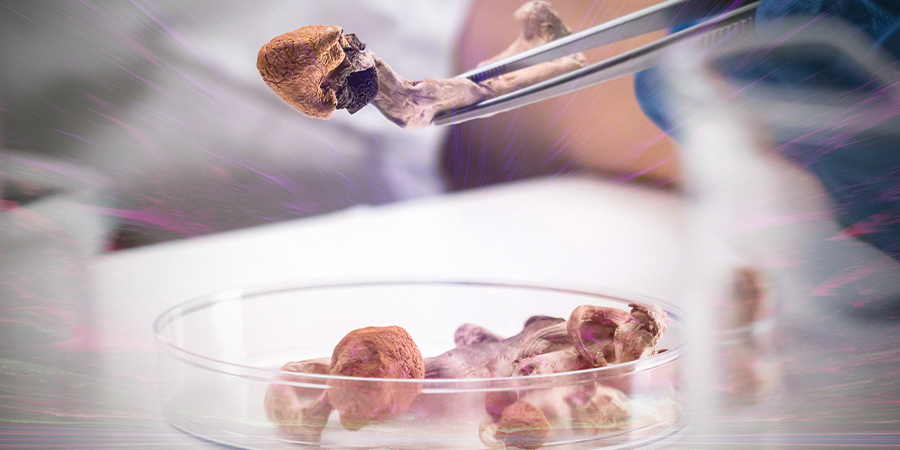
As mentioned, there is exciting progress regarding research into psilocybin’s potential as an addiction treatment. In a proof-of-concept study, it was found that a single psilocybin experience was able to help long-term, treatment-resistant smokers stop immediately.
Alongside the dual process of neurotransmission and neuron activity outlined above, magic mushrooms also have a powerful effect on the brain’s default mode network (DMN). The DMN could be thought of as where the sense of self lives, and it can be unhelpful sometimes. Many areas of the brain communicate via the DMN, and it also has a tendency to become introspective. When people get addictive cravings, fMRI scans indicate that the DMN lights up—suggesting the DMN is crucial to understanding addiction.
Under the influence of psilocybin, regions of the brain normally not connected in any way are able to communicate directly with one another, and the usually powerful role of the DMN becomes reduced. When the DMN becomes less dominant, it appears that, while people may still experience cravings, they become less consuming.
Nicotine is far from the only substance studied. There is evidence that psilocybin could help with overcoming opioid addictions and many others.
It looks as though this process allows the brain to bypass pathways associated with addiction, and form new ones. The exact process is, as yet, unknown, and this should be taken as speculation. Nevertheless, the evidence is both promising and growing.
SHOULD YOU WORRY ABOUT MAGIC MUSHROOM ADDICTION?
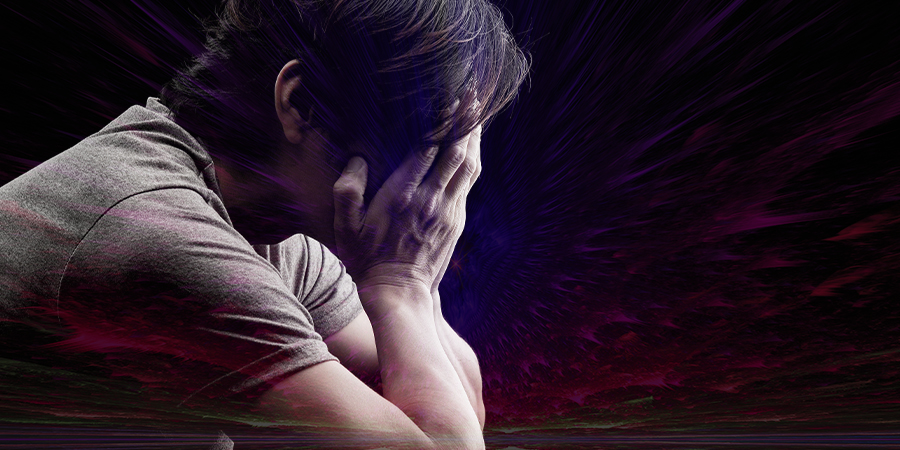
There are many substances and behaviours for which you should have more concern about becoming addicted! That being said, while you should probably not be worried about becoming addicted to magic mushrooms, you should exercise caution.
It’s not impossible for mushroom use to become pathological and detrimental to your or someone else’s life. If you have a sense that your shroom use might be addictive, take a break for a while and assess it from a distance.
All in all, though, it seems that more than worrying about the addictive properties of psilocybin mushrooms, we should be excited and actively curious about their potential to address all manner of addictions.










